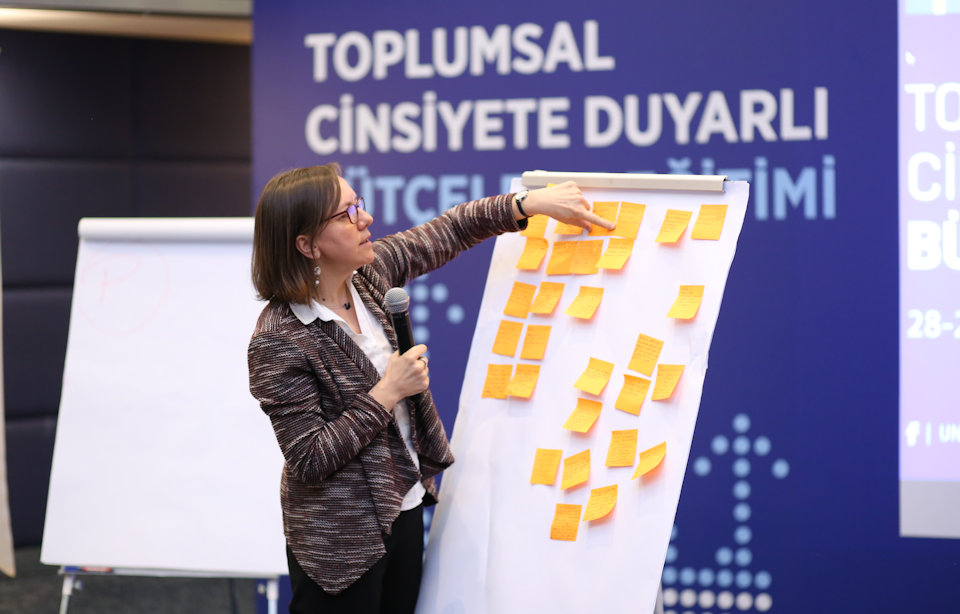Gender-responsive planning and budgeting

Women and men’s different private and social responsibilities and opportunities give rise to differing needs and priorities. Public policies and budgets that fail to adequately address these different needs and priorities can aggravate existing gender inequalities.
Gender-responsive budgeting (GRB) is a public policy tool that analyses central and local administrative budgets to assess gender funding gaps, identify actions to close them and ensure that national and local commitments to gender equality and women’s empowerment are adequately funded.
UN Women in Türkiye works with central government, municipalities, and civil society organisations to strengthen their capacity to analyse, prepare and monitor their budgets with a gender perspective.
UN Women in Action in Türkiye
In December 2020, UN Women began the European Union-funded three-year project Implementing Gender-Responsive Planning and Budgeting in Turkey. Working with the Ministry of Family, Labour and Social Services - General Directorate on the Status of Women and the Presidency of Türkiye - Presidency of Strategy and Budget (PSB), the project showcases how gender-responsive budgeting (GRB) can address persistent gender inequalities to improve women’s lives and foster gender-responsive development. Its goal is to integrate a gender perspective in all national and local policy-making and budgeting processes. It provides tailored technical assistance and guidance at local and national levels. The project will target selected line Ministries and four pilot municipalities (Edirne Municipality, Eskisehir Metropolitan Municipality, Gaziantep Metropolitan Municipality, Kocaeli Metropolitan Municipality).
The key activities of the project include;
- Establishment and functioning of an Advisory Board, Technical Working Group and Gender Budget Groups to provide guidance and support for effective implementation of GRB,
- Awareness raising seminars for senior managers and high-level representatives to create positive attitude towards GRB,
- Training programs for public officials and Municipalities to focus on the best examples and effective implementation of GRB Analysis,
- Setting up an online knowledge management platform to create a sustainable source of information on GRB,
- Experience sharing meeting, dialogue meetings for sustaining the ownership and cultivate constructive collaboration.
- Conducting GRB analysis on selected municipal services, development of Guideline on GRB Analysis.
Within the Gender Equality in Political Leadership and Participation in Türkiye Project 2014-2020, UN Women Türkiye worked with administrative departments of the Turkish Grand National Assembly (TGNA) to build capacities and pilot measures to enhance gender-responsive Parliamentary budgets. UN Women also helped to bring a gender perspective into plans and budgets of selected municipalities. Key achievements and activities include:
- Integrating gender-responsive budgeting and related performance indicators into the 2019 Budget Call and 2018-2022 Strategic Plan of the TGNA Secretariat;
- Including a gender equality awareness module into the induction training for new staff in of the TGNA;
- Training 215 parliament and ministry staff responsible for budget processes in gender-responsive budgeting;
- Conducting an analysis of the Parliament’s budget to identify gaps and propose projects to advance gender equality in the Parliament;
- Providing training in gender-responsive budgeting and service delivery to public officials and women leaders from 23 municipalities that resulted in concrete practices within their localities.
For more information about the project, see the brochure here and visit project’s website.
From 2012 - 2015, UN Women led the gender-responsive budgeting component of the UN Joint Programme for Promoting the Human Rights of Women in partnership with UNDP, funded by the Sabancı Foundation. The project assisted local administrations, women’s civil society organizations, and women’s studies centres in 11 provinces to monitor local governments for their compliance with national gender equality commitments in their plans and budgets. For more information, see the brochure here.